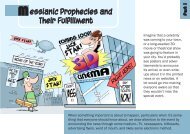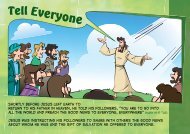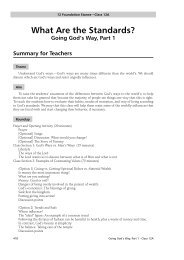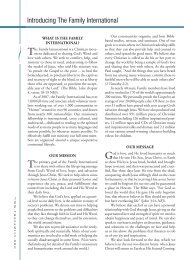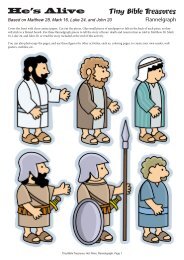COMPLETE - T F I O n l i n e
COMPLETE - T F I O n l i n e
COMPLETE - T F I O n l i n e
Create successful ePaper yourself
Turn your PDF publications into a flip-book with our unique Google optimized e-Paper software.
ting diodes will help you conserve<br />
juice.<br />
Camping gear—butane<br />
stoves, coolers and lightweight<br />
tents—easily doubles as survival<br />
gear. What else An adapter<br />
that turns your car’s cigarette<br />
lighter into an electrical outlet<br />
for any appliance could be a<br />
lifesaver. Stash all this stuff in<br />
a plastic box that can serve to<br />
float things out to safety.<br />
DOCUMENTS. Pulling<br />
together documents you need<br />
on the run may be the hardest<br />
thing to do. Prepare a book<br />
with copies of birth and marriage<br />
certificates, adoption<br />
papers, key identification numbers,<br />
copies of bank statements,<br />
deeds, titles, credit cards and insurance<br />
policies as well as passwords<br />
to online accounts. Keep<br />
it in a secure place and grab it<br />
on the way out of the house.<br />
GUNS. Some survivalists recommend<br />
a gun for protection.<br />
But if you haven’t used one regularly,<br />
don’t know how to store it<br />
safely and haven’t made the moral<br />
decision that you could shoot<br />
a person, forget it. Someone is<br />
just going to get hurt and it will<br />
probably be you. Your best protection<br />
is banding together with<br />
neighbors—and sharing that<br />
food all of you stashed.<br />
LOOKING OUT FOR<br />
YOUR NEIGHBOR. In emergency<br />
preparedness, one element<br />
shouldn’t be overlooked,<br />
experts say: the critical role<br />
individuals and families play<br />
through their personal readiness<br />
and commitment to looking<br />
out for their neighbor.<br />
Fostering that kind of attitude<br />
can have a marked longterm<br />
effect on preparedness,<br />
says Ann Patton, an emergency<br />
planning consultant in Tulsa,<br />
Oklahoma. “The best defense<br />
against disaster is a close-knit<br />
community of people who care<br />
about each other and take care<br />
of each other,” she says.<br />
Getting down to specifics,<br />
here are the sort of emergency<br />
supplies you and your family<br />
may find helpful in an emergency,<br />
as well as a three-step plan<br />
for preparedness:<br />
1) GATHER YOUR SUPPLIES<br />
Bottled water (1 gallon per<br />
person per day; three-day supply<br />
ideal)<br />
Cash (ATM and credit cards<br />
may not work or be accepted<br />
by businesses)<br />
Cellphone (with nonelectrical<br />
charger, such as a car charger<br />
or AAA battery pack)<br />
Clothing and underwear<br />
Phone numbers of friends<br />
and family<br />
Documents (driver’s license,<br />
passport, birth certificate, etc.)<br />
in a waterproof container<br />
Eating utensils (plastic or<br />
disposable)<br />
Emergency numbers: local,<br />
state, and federal<br />
Financial inventory (a list of<br />
bank and investment accounts,<br />
mortgages, and loans, including<br />
account numbers and location<br />
of original documents)<br />
First-aid kit<br />
Flashlight with extra batteries<br />
Food (canned goods and<br />
other nonperishable items that<br />
don’t require cooking)<br />
Masking tape, duct tape<br />
Medical information (list of<br />
your medications, any chronic<br />
conditions, and medical history)<br />
Medications (three-day supply<br />
of all daily medications)<br />
Paper towels, toilet paper,<br />
and sanitary products<br />
Plastic sheeting<br />
Radio (battery-operated)<br />
with extra batteries<br />
Scissors<br />
Sleeping bags or blankets<br />
(one per person)<br />
Toiletries (soap, toothpaste,<br />
toothbrush, etc.)<br />
Tools (can opener, knife,<br />
pliers; a Swiss Army knife may<br />
suffice)<br />
Trash bags<br />
2) CREATE A PORTABLE<br />
SUPPLY KIT<br />
In case you have to evacuate<br />
your home, it is good to put the<br />
supplies you think you would<br />
need the most in a portable<br />
container.<br />
Some people try to fit all<br />
of the supplies listed above in<br />
a large rolling cooler. Another<br />
option is to store the items in<br />
several small coolers or boxes.<br />
Think about what supplies<br />
you need, what you can reasonably<br />
carry or store in your car,<br />
and how many people will be<br />
available to help you transport<br />
the supplies.<br />
3) DEVELOP AND PRACTICE<br />
AN EMERGENCY PLAN<br />
All the planning in the<br />
world won’t do much good if<br />
you don’t practice ahead of<br />
time. Not only does this enable<br />
you to go through your plan<br />
while you’re calm and thinking<br />
clearly, but it also enables you<br />
to fine-tune it before you have<br />
to put it into action.<br />
❪❪ The News with Heaven’s Views ❫❫<br />
21




